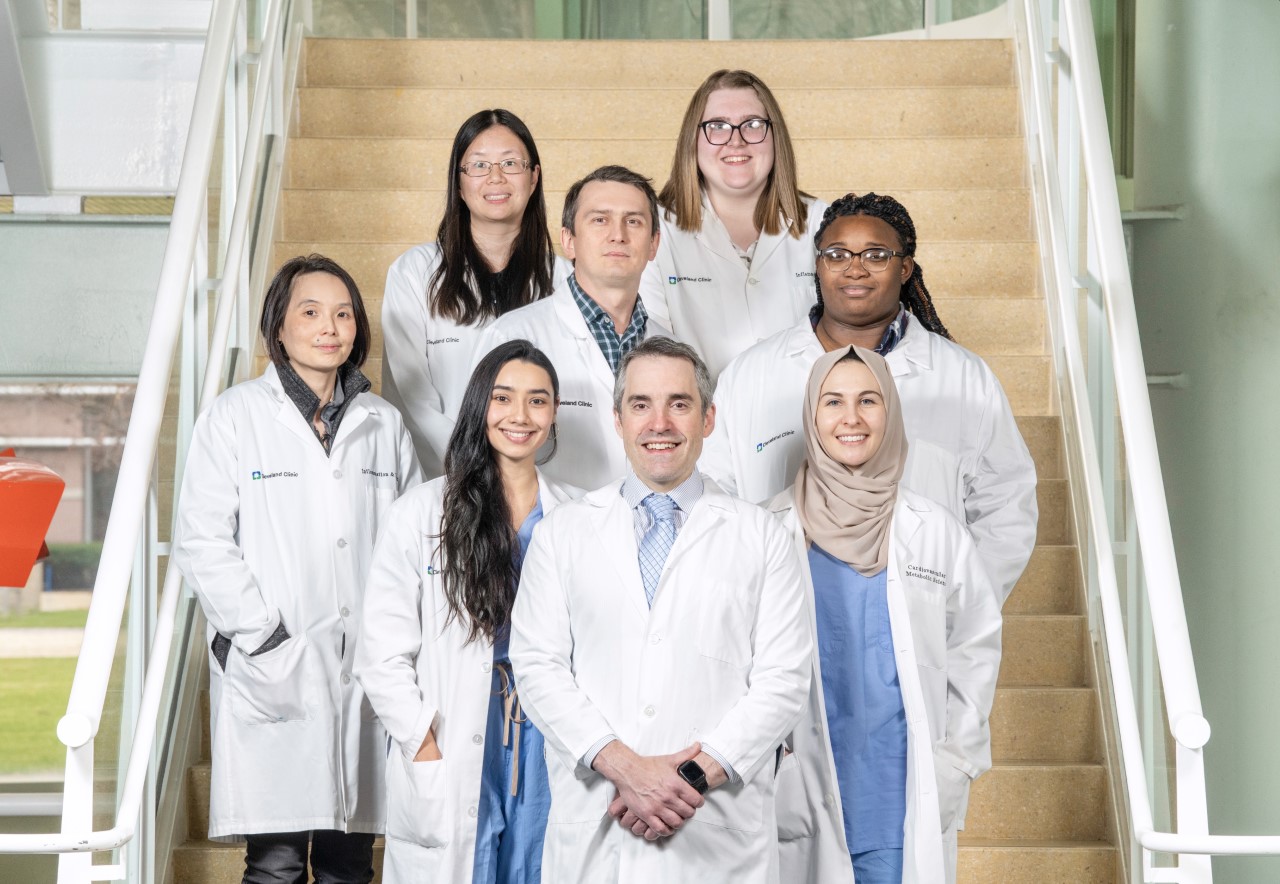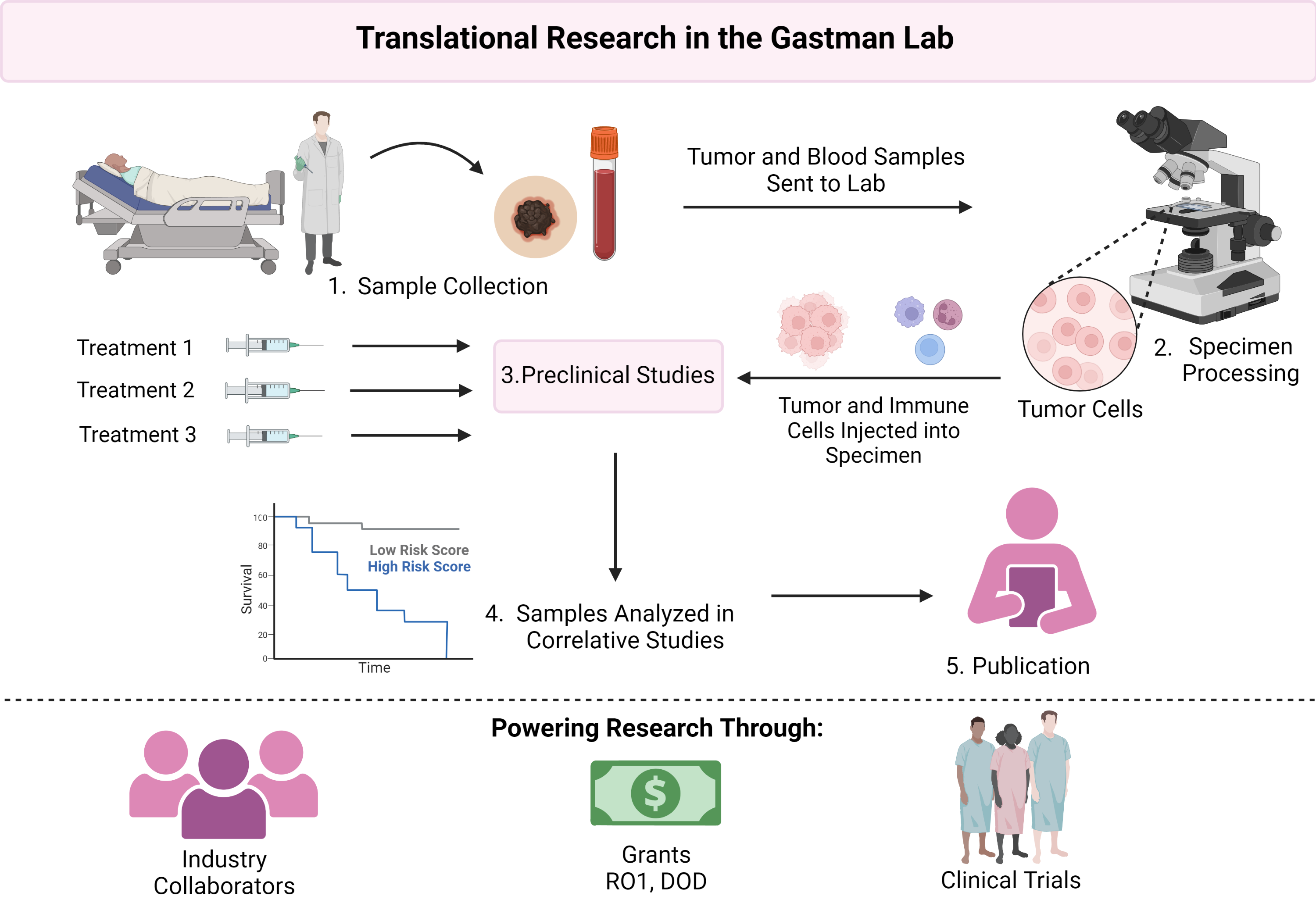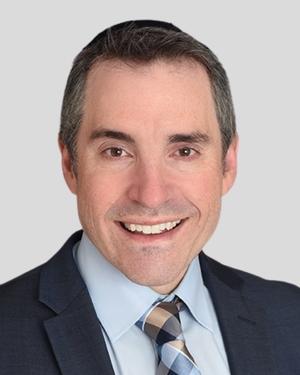Laboratory
Research
The Gastman lab investigates tumor immunology and the novel inhibitory strategies that enhance current immunotherapeutic approaches, as well as cancer therapy resistance and oncogenes that will ultimately have clinical utility.
Biography
Dr. Brian Gastman is a double boarded Plastic Surgeon and Otolaryngologist with additional fellowships in head and neck surgery, microsurgery and cancer research. Currently, Dr. Gastman is the Medical and Surgical Director of the Melanoma & High-Risk Skin Cancer Program at Cleveland Clinic and leads his translational research laboratory at the Lerner Research Institute. His specific interest entails the comprehensive care of soft tissue malignancies, such as melanoma, non-melanoma skin cancers, sarcomas and head and neck cancer. He is recipient of various grants, including RO1 NIH and DOD grants, and has served as principal investigator in five investigator initiated exploratory clinical trials assessing novel immunotherapeutic regimens. He has also led several national and international phase II-III clinical trials (e.g., NCT03712605, NCT03901573, NCT04099251, NCT04144517) and is heavily involved in non-therapeutic clinical studies evaluating emerging prognostic and predictive tools.
Additionally, Dr. Gastman is the Plastic Surgery Research Council chair and belongs to the Society of Immunotherapy of Cancer's Melanoma Task Force and numerous National Comprehensive Cancer Network (NCCN) panels. His research has led to important advances in clinical management of diseases and he has helped develop treatment guidelines for numerous cancers – including melanoma, squamous cell, basal cell, Merkel cell and DFSP. He is also highly involved with the National Cancer Institute (NCI) based Cancer Immunotherapy Trial's network (CITN), Eastern Cooperative Oncology Group (ECOG), and Southwest Oncology Group (SWOG), which helps him bring in some of the latest clinical trials to the Cleveland Clinic. Please refer to the following link for active clinical trials.
Building on his experience and interests, Dr. Gastman assembled a highly efficient and experienced research team dedicated to procuring, banking and analyzing clinically annotated blood and tumor specimens from patients treated with immunotherapy, as well as conducting translational research in the immuno-oncology field, translating the mechanistic findings into predictive tools to guide patient specific therapy.
Education & Professional Highlights
Education & Fellowships
Residency - University of Pittsburgh Medical Center & Children's Hospital of Pittsburgh
Plastic Surgery
Pittsburgh, PA USA
2005
Residency - UPMC School of Medicine Plastic Surgery Residency
Plastic Surgery
Pittsburgh, PA USA
2005
Fellowship - Washington University St. Louis Medical Center
Head & Neck Surgery
St. Louis, MO USA
2003
Fellowship - Washington University Hospitals
Head & Neck Surgery
St. Louis, MO USA
2003
Residency - University of Pittsburgh Medical Center & Children's Hospital of Pittsburgh
Otolaryngology
Pittsburgh, PA USA
2002
Residency - UPMC Univ. of Pittsburgh-Eye and Ear Institute
Otolaryngology
Pittsburgh, PA USA
2002
Internship - University of Pittsburgh Medical Center & Children's Hospital of Pittsburgh
General Surgery
Pittsburgh, PA USA
1997
Internship - UPMC, Univ. of Pittsburgh Medical Center
Pittsburgh, PA USA
1997
Medical Education - University of Michigan Medical School
MD
Ann Arbor, MI USA
1996
Certifications
- Otolaryngology - Head and Neck Surgery
- Plastic Surgery
- Otolaryngology
Awards & Honors
- Cleveland Clinic Award
- Awarded to the top caregiver team; for the treatment of face transplant patient
- CCF Caregiver Celebrations Award
- Cleveland Clinic Innovator Award
- Top Surgical Activity, Maryland General Hospital, Department of Surgery
- Rising Star Award, Maryland General Hospital
- Resident Research Award, George C. & Robert A. Schein Memorial Otolaryngology Alumni Day
- First Prize Resident Research Award, American Head and Neck Society Scientific Program
- NIH Postdoctoral Fellow Award
- National Research Service Award
- Liaison Program Scholarly Award
Memberships
- American Society of Clinical Oncology
2018 - Fellow, American Association of Plastic Surgeons
2013 - American Society for Microbiology
2011 - Plastic Surgery Research Council
2011 - American Society of Plastic Surgeons
2006 - American Association of Otolaryngology - Head and Neck Surgery
2002
Research
Overview

Dr. Gastman and lab members.
The Gastman Lab is focused on building the bridge between basic science and clinical practice in order to provide state of the art care for patients. Robust collaborative interactions between scientists, industry, and healthcare professionals allow the continued research into identifying disease states, diagnostic tools for detecting at-risk individuals, and the investigation of the efficacy of therapeutic interventions.
Tumor Immunology and Immunotherapy Research:
We are interested in elucidating the tumor immunology and microenvironment leading to disease development and treatment response. Currently we are investigating the mechanisms by which a novel CD8+ T cell population discovered by our team mediates immunotherapy resistance, and are testing various therapy regimens targeting this T cell subset to improve responses to anti-PD-1 based therapy.
Preclinical Mouse Model Development:
The development of predictive preclinical models to evaluate ‘next-generation’ immunotherapies prior to clinical investigation in patients is a critical aspect of the work done at the Gastman Lab. We developed an all autologous humanized melanoma xenograft mouse model utilizing matched patient tumor cells and peripheral blood mononuclear cells to evaluate novel immunotherapies and synergistic combination treatment strategies.
Involvement of Cellular Death Responses and Pathways in Understanding Diseases:
Biological events and pathways of cell death/aging mediate disease progressions and treatments, and often promote or inhibit therapeutic responses. We are interested in understanding one important molecule, MCL1, involved in these pathways. Our work highly entails the identification of putative small molecule inhibitors of these pathways, and analyzing their overall utility and effectiveness for therapeutic purposes. We recently found that specific DNA damaging chemotherapies promote nuclear MCL1 translocation in colorectal cancer (CRC) models. In p53null CRC, this process is associated with resistance to chemotherapeutic agents, the mechanism of which is distinct from the classical mitochondrial protection.
Powering Research Through Industries:
Most of our work is a product of rich collaborations with industries focused in improving treatment regimens and overall patient care. In this space, we conduct immunotherapy testing, tumor infiltrative lymphocyte (TIL) therapy, tumor processing for molecular diagnosis, and are constantly looking for innovative approaches to improve the diagnosis and treatment of various malignancies. We have collaborated with industries in all stages of disease, from prevention and diagnostics to therapeutics and surgical innovation, to generate new advances in the field of medical oncology.
In the News
Articles
Q&A: Identifying, treating rare mucosal melanoma | Healio
Katie's face: Where a bullet and an overdose intersected, Cleveland Clinic doctors gave new life | Cleveland.com
Face Transplants: The Changing Face of Medicine | Cleveland Clinic Newsroom
Historic face transplant gives suicide survivor a ‘second chance’ | CNN Health
Podcasts
Merkel Cell Carcinoma | Cancer Advances Podcast
Conversations in Mohs Surgery: Dr. Brian Gastman | ACMS Podcast
What to Know About Melanoma | Butts & Guts Podcast
Are face transplants the future of cosmetic surgery? | UK Podcasts – Eureka!
Translational Research in the Gastman Lab
 Created with BioRender.com.
Created with BioRender.com.
All numbers correlate to those at various steps of the workflow diagram.
- Collection of tumor and blood samples from patients in surgery. Patients are mainly from high-risk melanoma and skin cancer programs.
- Processing of specimens in lab to collect tumor and immune cells, as well as frozen tumor and plasma.
- Tumor and immune cells are injected to preclinical specimen to construct a humanized model, which mimics the patient’s unique cells and condition. Different therapies are tested on the specimens.
- Blood, tumor and spleen are extracted from the preclinical specimen and analyzed through correlative studies, along with an analysis of biological events and pathways involved in cellular death responses and disease progression.
- Manuscripts are written based on conclusions from data collected during research and are subsequently published in various journals.
- From here, the findings generated in this translational process can lead to the development of industry collaborations, the awarding of various grants (DOD, RO1, etc.), and the beginning of clinical trials for new patients.
Our Team
Selected Publications
View publications for ,
(Disclaimer: This search is powered by PubMed, a service of the U.S. National Library of Medicine. PubMed is a third-party website with no affiliation with Cleveland Clinic.)
Publications
Li, C., Phoon, Y. P., Karlinsey, K., Tian, Y. F., Thapaliya, S., Thongkum, A., ... & Gastman, B. R. (2021). A high OXPHOS CD8 T cell subset is predictive of immunotherapy resistance in melanoma patients. Journal of Experimental Medicine, 219(1), e20202084.
Pfannenstiel, L. W., Diaz-Montero, C. M., Tian, Y. F., Scharpf, J., Ko, J. S., & Gastman, B. R. (2019). Immune-checkpoint blockade opposes CD8+ T-cell suppression in human and murine Cancer. Cancer immunology research, 7(3), 510-525.
Gastman, B. R., Zager, J. S., Messina, J. L., Cook, R. W., Covington, K. R., Middlebrook, B., ... & Vetto, J. T. (2019). Performance of a 31‐gene expression profile test in cutaneous melanomas of the head and neck. Head & Neck, 41(4), 871-879.
Bolesta, E., Pfannenstiel, L. W., Demelash, A., Lesniewski, M. L., Tobin, M., Schlanger, S. E., ... & Gastman, B. R. (2012). Inhibition of Mcl-1 promotes senescence in cancer cells: implications for preventing tumor growth and chemotherapy resistance. Molecular and cellular biology, 32(10), 1879-1892.
Presentations
Alkermes to Present Data on Nemvaleukin Alfa at the Society for Immunotherapy of Cancer's (SITC) 36th Annual Meeting. Presenter: Brian Gastman, MD
Nuclear translocation of McI-1 induces chemoresistance of colorectal cancer. Case Comprehensive Cancer Center Case Gastrointestinal Cancers SPORE Retreat. Virtual. May 19, 2021. Presenter: Brian Gastman, MD
Brian R. Gastman, Howard L. Kaufman. The Surgeon’s Impact on Tumor Immunotherapy. Surgery Committee Session Co-Chair. Society for Immunotherapy of Cancer's (SITC) 35th Anniversary Annual Meeting. 2020. November 11, 2020.
Lillian Sun, Jennifer Ko, Allison Vidimos, Shlomo Koyfman, Brian Gastman. A Distinctive Lineage Negative Cell Population Produces IL-17A in Cutaneous Squamous Cell Carcinoma. Society for Immunotherapy of Cancer's (SITC) 34th Annual Meeting. 2019. November 6-10, 2019.
Brian R. Gastman. Metabolically active dysfunctional T cells are major regulators in immunotherapy response in melanoma. The Korea Association of Immunologists national meeting. Seoul, Korea. September 6th, 2019.
Brian R. Gastman, Jeffery Koslow, Anthony Tufaro. Melanoma update course. American Society of Plastic Surgeons Annual Meeting. San Diego, CA. September 2019.
Careers
The Gastman Lab is actively seeking applicants for a postdoctoral fellow and animal technician. Please see job details and required experience for each position at the links included below:
Animal Husbandry Technician II
If questions arise at any point, please contact Dr. Brian Gastman ([email protected]) or Dr. Yee Peng Phoon ([email protected]).
Training at Lerner Research Institute
Our education and training programs offer hands-on experience at one of the nationʼs top hospitals. Travel, publish in high impact journals and collaborate with investigators to solve real-world biomedical research questions.
Learn MoreResearch News

Dr. Gastman and collaborators have published findings indicating Bcl-xL inhibitors may help overcome this complication.

Dr. Gastman’s team found that high levels of a CD8 T-cell subpopulation may predict immune checkpoint inhibitor therapy resistance in melanoma.
